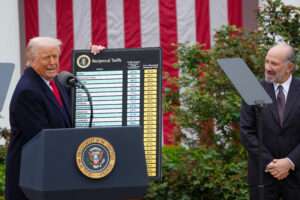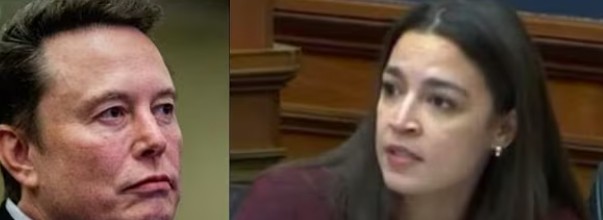 President Donald Trump signed two executive orders on April 2 instituting tariffs on a wide range of countries. ( Andrew Leyden/ZUMAPRESS/Newscom)
President Donald Trump signed two executive orders on April 2 instituting tariffs on a wide range of countries. ( Andrew Leyden/ZUMAPRESS/Newscom)
Last week, the US Court of International Trade issued a major ruling striking down Trump's massive "Liberation Day" tariffs and other tariffs imposed under the the International Emergency Economic Powers Act of 1977 (IEEPA). The ruling came in a case filed by Liberty Justice Center and myself on behalf of five US businesses harmed by the tariffs, and also covers a related case filed by twelve states led by Oregon. The case is now on appeal to the US Court of Appeals for the Federal Circuit, and that court has issued a brief "administrative stay" temporarily blocking enforcement of the CIT decision to give time to consider whether there should be a more permanent stay pending appeal.
The stay question may seem like one of those technical legal issues of interest only to lawyers and academics. But, in this case, it has great practical significance. If we defeat the government's motion for a stay pending appeal, the tariffs will be quickly lifted (probably within a few days after the administrative stay ends), and businesses that have previously paid IEEPA tariffs can begin the process of getting them refunded. That would stop the vast damage these tariffs are inflicting on many thousands of businesses (like our clients) who depend on imports, and tens of millions of consumers who face higher prices on a vast range of goods. If, on the other hand, the Federal Circuit grants the motion for a stay pending appeal, the tariffs will stay in place until the appellate process is over, which could take months, or even a year or more (if the case gets to the Supreme Court).
I won't go over the arguments on the stay issue in detail here. But those interested can read the government's motion for a stay here, and our response here.
One factor courts consider in assessing a motion to stay is which side is likely to ultimately prevail on the merits. I've written about the merits at length elsewhere (e.g. here), and obviously I think we deserve to win! I will merely note that the Trump administration continues to claim IEEPA gives the president virtually unlimited power to impose any tariffs he wants, on any nation, for any reason, for any length of time. I am hopeful that appellate judges will find that unacceptable, just like the CIT panel did.
Another key factor is which side is likely to suffer "irreparable harm" if they lose on the stay issue. We argue that our clients - and thousands of other businesses - will suffer great irreparable harm if a stay is imposed. They will lose sales due to higher prices, good will can be lost, relationships with suppliers and investors will be disrupted, and more. Those harms can't be made up merely by refunding tariff payments months from now, after the appellate process concludes. On the other hand, as explained in our brief, the government doesn't suffer any legally cognizable harm from being denied the right to impose illegal tariffs. And US credibility on the international stage will, we explain, suffer more damage if the administration continues to try to use illegal tariffs as leverage in negotiations with trading partners than if that travesty is ended immediately.
Another issue at stake here is whether the CIT injunction should be stayed with respect to non-parties, but immediately implemented with respect to the plaintiffs in the two cases. We argue that only universal implementation can fully prevent irreparable harm to our clients. In addition, a partial stay would be unconstitutional, violating the Constitution's requirement that tariffs be uniform, as explained in this passage from our brief:
As the CIT observed in its ruling granting summary judgment:
There is no question here of narrowly tailored relief; if the challenged Tariff Orders are unlawful as to Plaintiffs they are unlawful as to all. "[A]ll Duties, Imposts and Excises
shall be uniform throughout the United States," U.S. Const. art. I, § 8, cl. 1, and "[t]he tax is uniform when it operates with the same force and effect in every place where the
subject of it is found." Slip Op. 48–49 (quoting Head Money Cases, 112 U.S. 580, 594 (1884)).
A non-uniform tariff imposed as a result of a ruling staying the injunction for nonparties would be unconstitutional, since it would, by definition, not "operate with the same force and effect" everywhere. Id. In addition, it would necessarily create a highly non-uniform tariff schedule, thus rendering that schedule unconstitutional.
If the Federal Circuit denies the government's motion for a stay, they could potentially ask the Supreme Court to impose one. I will have more to say about that eventuality when and if it occurs.
The post The Legal Battle Over the Motion to Stay the Decision Against Trump's Tariffs appeared first on Reason.com.













 Bengali (Bangladesh) ·
Bengali (Bangladesh) ·  English (United States) ·
English (United States) ·